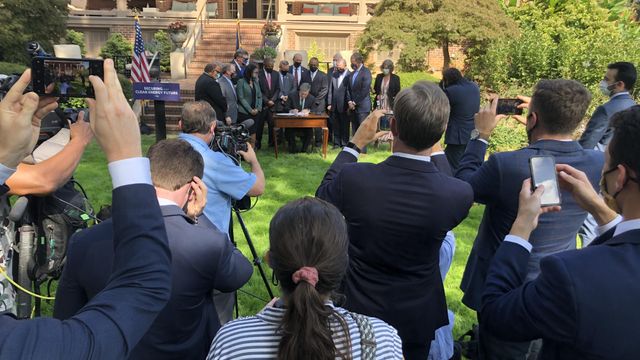NC's energy bill now law, calls for major carbon reductions
Concerns linger over bill's fine print and price increases for customers.
Posted — UpdatedGov. Roy Cooper signed House Bill 951 on Wednesday after months of negotiations and a bill that went through at least 49 drafts. The measure had widespread bipartisan support in the legislature, and it won high praise Wednesday from state leaders who dubbed it a transformational step.
Cost concerns remain, though, from advocates for the poor, and environmental groups worry the bill has too much wiggle room, leaving them uncertain of its ultimate impact on climate change.
The bill-signing drew top Republican and Democratic leaders to the Executive Mansion, a signal of the bipartisanship that has become more common this year on a number of issues at the statehouse.
"Today, North Carolina moves strongly into a reliable and affordable clean energy future," Cooper said at the press conference.
"[This is] a huge step forward that other states will be able to follow," House Speaker Tim Moore said.
Senate President Pro Tem Phil Berger said the bill sets up a framework that "ensures continued reliability" from the state's energy grid while also requiring the lowest-cost mix of of energy production.
The bill tells the North Carolina Utilities Commission, which regulates electricity producers in the state, to "take all reasonable steps" to cut carbon dioxide emission from Duke Energy's power plants by 70 percent, when compared with 2005 levels, by 2030. The bill's goal is to get to at or close to zero by 2050, with offsets that allow for some emissions.
The Utilities Commission will work with Duke, by far the state's largest electricity provider, to come up with a plan that must chart "the least cost path" to the targeted reductions.
Cooper said 15 states have similar requirements and that Virginia is the only other one in the Southeast. The Natural Resources Defense Council said North Carolina is the first with a Republican-controlled legislature "to codify such rigorous climate targets.
The bill doesn't require certain energy sources – so much solar energy, so much natural gas, so much nuclear – to replace the power lost when Duke closes coal plants early. That was in previous versions of the bill, but now it's up to the Utilities Commission to work with Duke on that mix.
But Cooper said the move away from coal-fired electricity baked into the bill "cements North Carolina's gains in solar energy and opens the door to much more."
The bill also allows the Utilities Commission to approve Duke rate increases up to three years at a time, something the company has wanted for years to scale back a lengthy, complicated and costly hearing process every time the company wants to raise rates. The measure also allows Duke to charge customers for costs of closing coal plants early, saying it has to securitize only half of the remaining net book value of "subcritical" coal-fired plants that are retired to hit the bill's carbon goals.
The North Carolina Council of Churches said in a statement that "energy solutions that also fall disproportionately on low-income communities are not real solutions."
"This plan is not designed to support those hurt first and worst by the ongoing climate crisis, and furthermore, we have significant concerns that the plan will fail due to poor design and drafted provisions that will make it easy for utilities to avoid the implementation of the plan," the group said in a statement.
Cooper said "the status quo was unacceptable," including for poorer North Carolinians.
The bill has some support from environmental groups, and particularly the Audobon Society, which has praised it. But others, including the Southern Environmental Law Center, whose attorneys closely follow the state's complex regulatory structure, criticized the measure. The SELC said earlier this month, as the bill moved toward passage, that it was worried the bill won't bring the promised carbon reductions.
Luis Martinez, the Natural Resources Defense Council's director of southeast energy called the bill "a big step forward," but also said in a statement that the bill has "flaws."
"From here, we will engage in every step of the process — particularly before the North Carolina Utilities Commission — to ensure progress on the carbon reductions and clean energy required by the bill and to ensure that we reduce the energy burden for low-income North Carolinians," Martinez said in a statement.
Cooper said the legislation gives the Utilities Commission the authority it needs to hit the bill's targets. Berger, R-Rockingham, who along with other Senate Republicans has focused on the bill's promises of a least-cost path on energy generation, as opposed to climate change ramifications, backed the governor's read Wednesday, saying he believed the 70 percent reduction would be achieved.
"We have the 70 percent out there," he said. "But we also have least cost."
Rep. John Szoka, R-Cumberland, who worked the bill for months in the legislature, said technological advances in the clean energy sector have outpaced expectations for years, and he expects that to carry the day.
"I really believe that we'll get there," said Szoka. "Technology is the changer here."
Related Topics
• Credits
Copyright 2024 by Capitol Broadcasting Company. All rights reserved. This material may not be published, broadcast, rewritten or redistributed.






